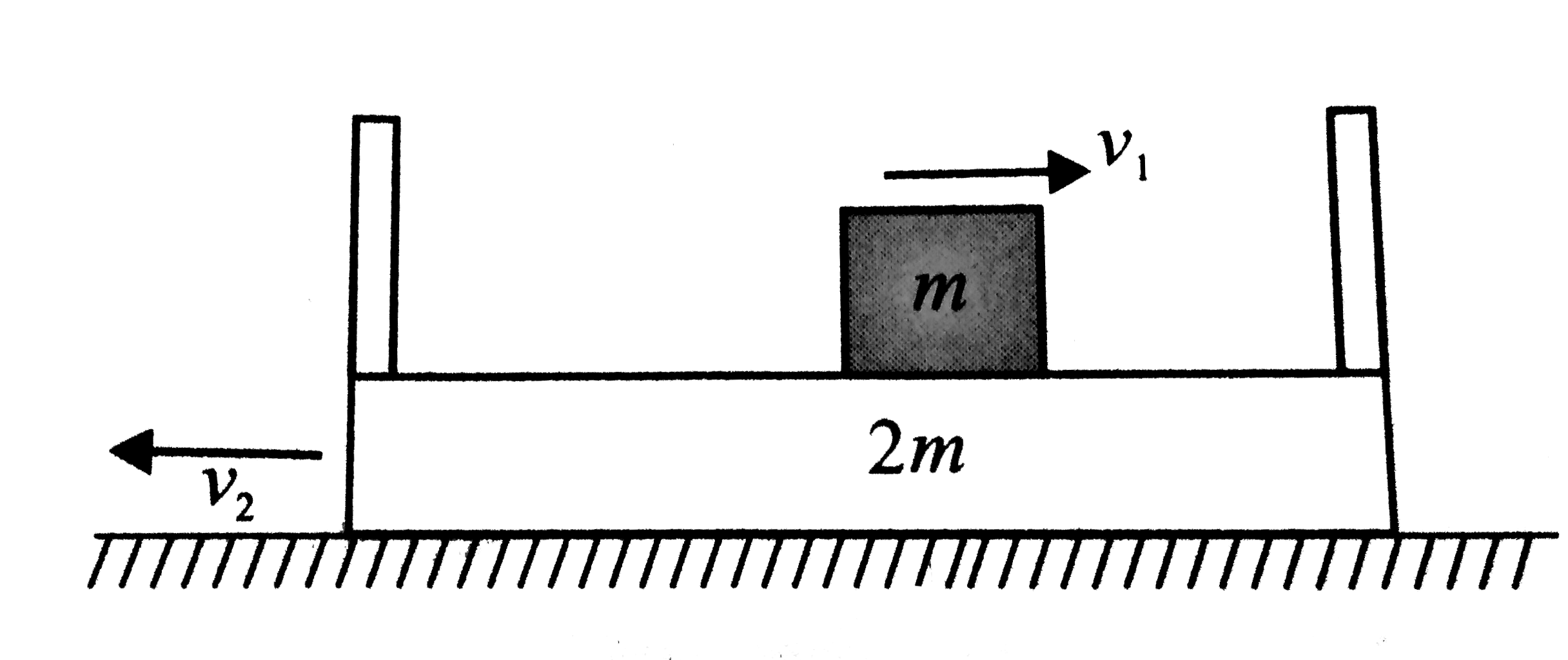According to the principle of conservation of linear momentum, if the external force acting on the system is zero, the linear momentum of the system will remain conserved. It means if the centre of mass of a system is initially at rest, it will remain, at rest in the absence of external force, that is, the displacement of centre of mass will be zero.
Two blocks of masses 'm'and '2m' are placed as shown in Fig. There is no friction anywhere. A spring of force constant k is attached to the bigger block. Mass 'm' is kept in touch with the spring but not attached to it. 'A' and 'B' are two supports attached to '2m'. Now m is moved towards left so that spring is compressed by distance 'x' and then the system is released from rest.

Find the relative velocity of the blocks after 'm' leaves contact with the spring.
A
√2k3m
B
3x√k2m
C
x√3k2m
D
none of these
Text Solution
The correct Answer is:C
mv1=2mv2

⇒v1−2v2
12mv21×2mv22=12kx2
Solving, we get
v1=2(√k6m)x,v2=(√k6m),x
Relative velocity
v1+v2=3(√k6m)x=x√32km
|
Topper's Solved these Questions
- CENTRE OF MASSBOOK - CENGAGE PHYSICSCHAPTER - CENTRE OF MASSEXERCISE - Integer
16 Videos
- CENTRE OF MASSBOOK - CENGAGE PHYSICSCHAPTER - CENTRE OF MASSEXERCISE - Fill In The Blanks
2 Videos
- CENTRE OF MASSBOOK - CENGAGE PHYSICSCHAPTER - CENTRE OF MASSEXERCISE - Assertion - Reasoning
2 Videos
- CALORIMETRYBOOK - CENGAGE PHYSICSCHAPTER - CALORIMETRYEXERCISE - Solved Example
13 Videos
- DIMENSIONS & MEASUREMENTBOOK - CENGAGE PHYSICSCHAPTER - DIMENSIONS & MEASUREMENTEXERCISE - Integer
2 Videos
Similar Questions
Knowledge Check
According to the principle of conservation of linear momentum, if the external force acting on the system is zero, the linear momentum of the system will remain conserved. It means if the centre of mass of a system is initially at rest, it will remain, at rest in the absence of external force, that is, the displacement of centre of mass will be zero.
Two blocks of masses 'm'and '2m' are placed as shown in Fig. There is no friction anywhere. A spring of force constant k is attached to the bigger block. Mass 'm' is kept in touch with the spring but not attached to it. 'A' and 'B' are two supports attached to '2m'. Now m is moved towards left so that spring is compressed by distance 'x' and then the system is released from rest.

What is the loss in the energy of the system due to breaking of B?A38kx2B34kx2C18kx2D58kx2If net external force acting on the system is zero then
AVelocity of the individual particle of the system will remain constantBVelocity of the center of mass of the system will remain constantCVelocity of the center of mass of the system will be zeroDVelocity of the individual particle of the system will be zeroAccording to the principle of conservation of linear momentum, if the external force acting on the system is zero, the linear momentum of the system will remain conserved. It means if the centre of mass of a system is initially at rest, it will remain, at rest in the absence of external force, that is, the displacement of centre of mass will be zero.
Two blocks of masses 'm'and '2m' are placed as shown in Fig. There is no friction anywhere. A spring of force constant k is attached to the bigger block. Mass 'm' is kept in touch with the spring but not attached to it. 'A' and 'B' are two supports attached to '2m'. Now m is moved towards left so that spring is compressed by distance 'x' and then the system is released from rest.

Now m arrives at B. Due to its inertia of motion 'm' breaks the support 'B' and due to some resistance offered by 'B' , the resulting velocity of 'm' is reduced to half of its previous value. Then what you can say about the velocity of 2m?AIt is also reduced to half of its previous valueBIt is reduced to less than half of its previous value.CIt is reduced to more than half of its previous value.DIt remains the same.
If the external forces acting on a system have zero resultant, the centre of mass
View SolutionIf the external forces acting on a system have zero resultant, the centre of mass
View SolutionIf the net external force acting on a system is zero, then the centre of mass?
View SolutionThe principle of conservation of linear momentum states that the linear momentum of a system
View SolutionThe principle of conservation of linear momentum states that the linear momentum of a system
View Solution
